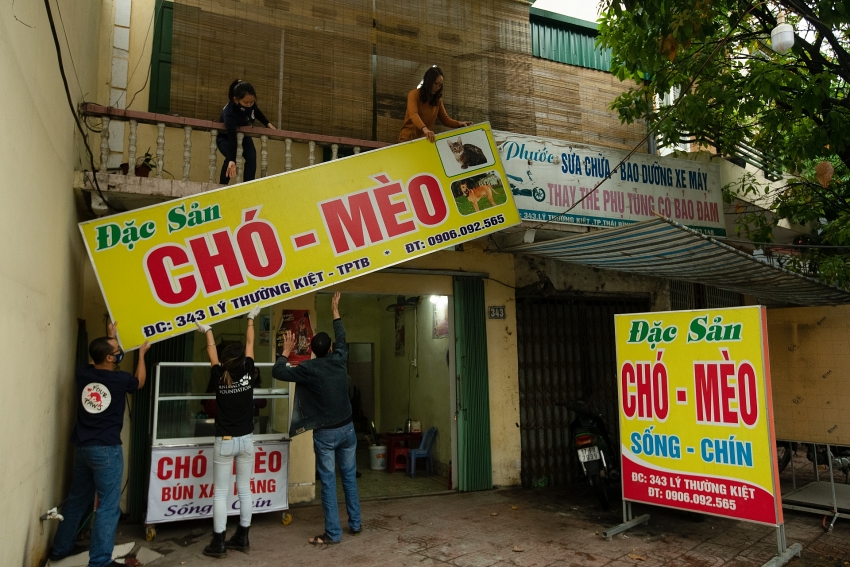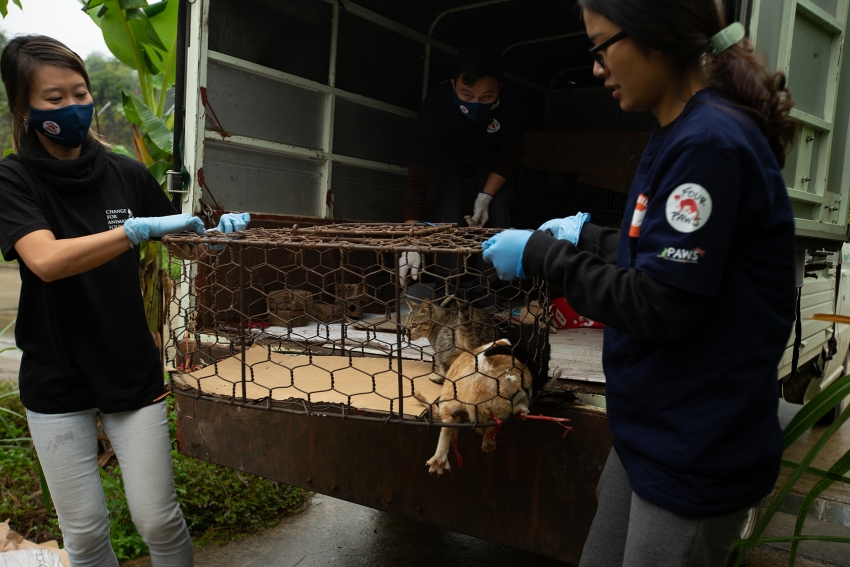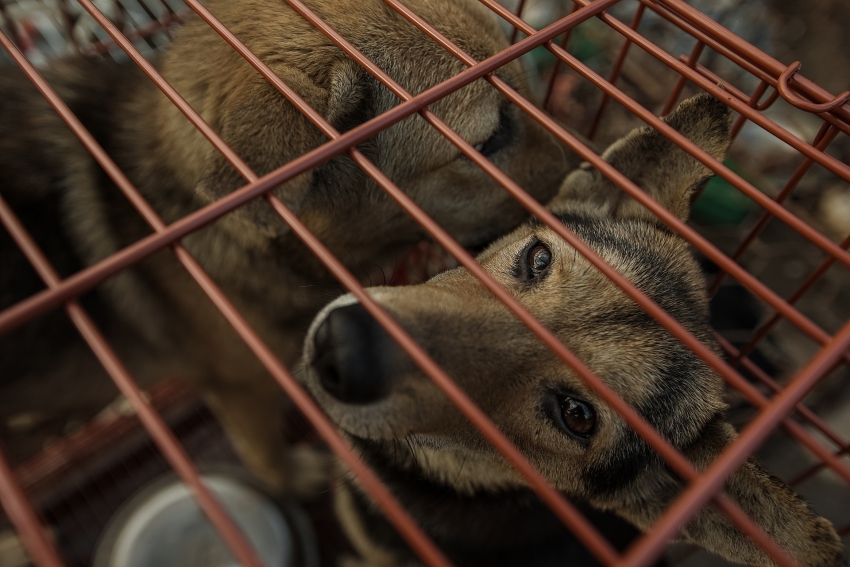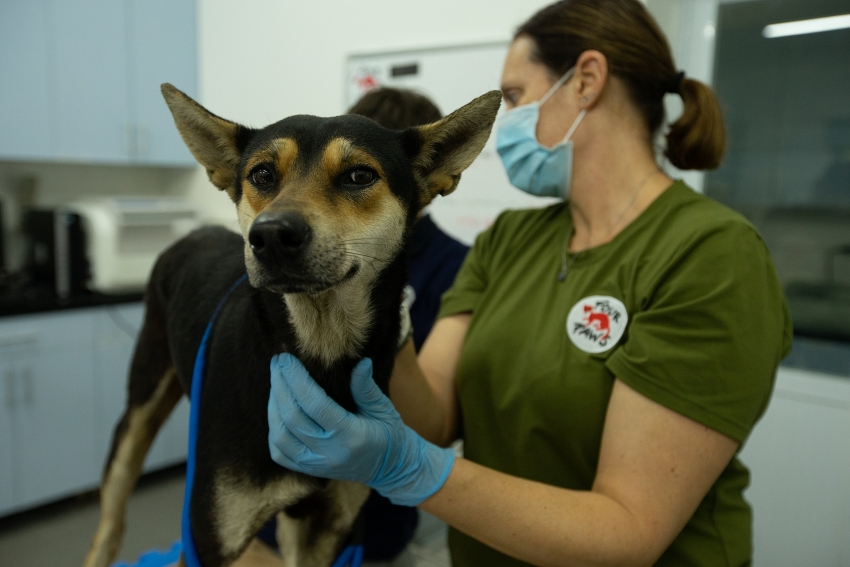Four Paws closes cat meat restaurant and slaughterhouse in Vietnam
 |
| Four Paws succeeded in shutting down a cat meat restaurant and associated slaughterhouse in Thai Binh province on December 15 |
The restaurant was located in the city of Thai Binh, notorious for cat meat consumption, and claimed to serve around 240 animals a month, the majority of them being cats. Four Paws took the rescued cats and dogs to its bear sanctuary in Ninh Binh, where vets provided the animals with urgent medical care. After initial treatment and rehabilitation, they will be put up for adoption.
 |
| 25 animals were rescued from brutal slaughter in Thai Binh |
The restaurant in Thai Binh – specialising in cat and dog meat dishes – first came to the attention of the Four Paws team following their nationwide research into the cat meat trade, which started in 2019.
The restaurant owners, a Vietnamese couple, expressed their desperation to get out of the trade due to the desire to no longer kill animals. Four Paws and Change for Animals Foundation is helping the couple set up a second-hand motorbike shop with the condition that they will never again engage in the cat and dog meat trade and that they will help Four Paws identify and close similar restaurants in the area.
 |
Every year, around five million dogs and one million cats are brutally slaughtered for their meat in Vietnam, many of them stolen pets.
Unlike the trade in dogs for meat, the cat meat trade goes unreported despite being considered a delicacy in Vietnam, making the trade highly lucrative. According to Four Paws research, a kilogramme of dog meat fetches between €6 ($7.30) and €9 ($10.90). Cat meat, on the other hand, can cost up to €11 ($13.30) – which can go up to €20 ($24.30) in the case of a black cat.
“Every year, millions of dogs and cats – both healthy and sick, owned and stray – are violently captured from the streets in Vietnam, crammed into tiny cages and transported unchecked across the country, with journeys often lasting days," says Dr. Katherine Polak, veterinarian and Head of Four Paws Stray Animal Care in Southeast Asia. "This is not only incredibly cruel to the animals, but also blatantly violates public health recommendations, especially in times like these.”
 |
The unsanitary conditions during transport as well as in slaughterhouses and restaurants, which often keep a wide variety of species for slaughter, encourage the emergence of zoonotic diseases, like COVID-19. In addition, the trade is linked to outbreaks of rabies and cholera. Dr. Polak added: “If Vietnam is really serious about protecting public health and fulfilling its commitment to end rabies in the country, the government must finally put a stop to the dog and cat meat trade.”
In contrast to the dog meat trade, the hunting, slaughter, and consumption of cats was explicitly prohibited in Vietnam until January 2020. The trade, though, is often fraught with illegality and brutality. As the increasing demand can no longer be met from stray animals alone, dog and cat meat traders often steal pets as well. As a result, violent confrontations between pet owners and thieves frequently occur, which in the past have even proved fatal.
For the restaurant closure, rescue, and successful rehoming of the animals, Four Paws and Change for Animals Foundation worked with local members of the Cats Matter Too coalition, including Hanoi Pet Rescue, Paws for Compassion and Vietnam Cat Welfare. To put a sustainable end to the cruel dog and cat meat trade in Southeast Asia, Four Paws has also launched a campaign on an international and national level. More than one million people worldwide have already signed the petition to end the dog and cat meat trade, including 200,000 Vietnamese.
In addition, in Vietnam, Four Paws supports local communities with humane and sustainable dog and cat population management programmes. Four Paws is also part of the animal welfare coalitions Dog Meat Free Indonesia (DMFI) and Asia Canine Protection Alliance (ACPA), which lobby against the dog and cat meat trade in Southeast Asia.
What the stars mean:
★ Poor ★ ★ Promising ★★★ Good ★★★★ Very good ★★★★★ Exceptional
Related Contents
Latest News
More News
- Congratulations from VFF Central Committee's int’l partners to 14th National Party Congress (January 25, 2026 | 09:46)
- List of newly-elected members of 14th Political Bureau announced (January 23, 2026 | 16:27)
- 14th Party Central Committee unanimously elects To Lam as General Secretary (January 23, 2026 | 16:22)
- List of members of 14th Party Central Committee announced (January 23, 2026 | 09:12)
- Highlights of fourth working day of 14th National Party Congress (January 23, 2026 | 09:06)
- Press provides timely, accurate coverage of 14th National Party Congress (January 22, 2026 | 09:49)
- Press release on second working day of 14th National Party Congress (January 22, 2026 | 09:19)
- Minister sets out key directions to promote intrinsic strength of Vietnamese culture (January 22, 2026 | 09:16)
- 14th National Party Congress: Renewed momentum for OVs to contribute to homeland (January 21, 2026 | 09:49)
- Party Congress building momentum for a new era of national growth (January 20, 2026 | 15:00)

 Tag:
Tag:




















 Mobile Version
Mobile Version